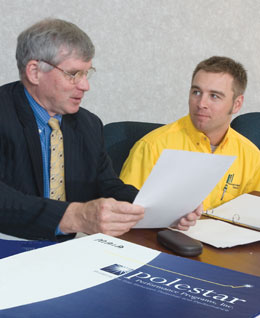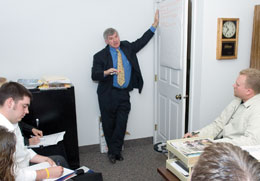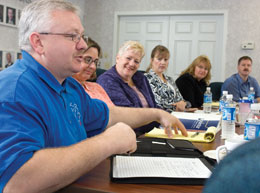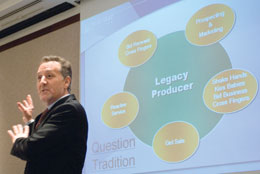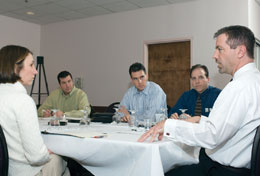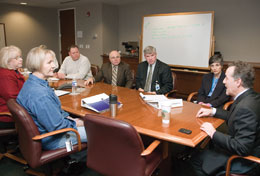 |
 |
 |
|
Giving producers a track to run on Polestar gives agencies a systematic approach to sales, marketing and value-added services By Thomas A. McCoy Eighteen producers from 11 different agencies, most relatively new to their jobs, gather around a horseshoe-shaped table in Lansing, Michigan. They are here to be coached by consultants and industry veterans from Polestar Performance Programs—insurance industry performance development specialists—who will help them reach their goals for production, client retention, sales and service efficiency, and profitability. The producers clearly enjoy the camaraderie and moral support they give each other. So the meeting begins with the producers sharing the triumphs and frustrations they’ve experienced in the marketplace since they last met six weeks ago. Kyle Thompson of the Fawcett Dopke Agency in Traverse City, Michigan, talks about calling on a prospect for one of his agency’s specialties—day care businesses. His first thought: “I’d rather handle something safer, like a toxic waste dump.” However, since day care is to be part of his marketing focus, Thompson takes a risk management approach. “The woman running the day care facility had some pallets at the back of her yard,” he says. “All I could think of was some kid getting hurt by a rusty nail.” He recommended the removal of the pallets. Shannon Decker talks about the challenges of producing commercial business while operating from her home and caring for small children. She lives in a town of 500 people, the nearest “large” town—Alpena—has a population of 11,000, and her agency’s main office in Grand Rapids is more than four hours away. Frankly, she admits, “I use my kids”—meaning the activities that connect her to other parents are helpful in building potential business relationships. Decker has followed Polestar’s advice on client contact and reports to her fellow producers, “I generated 10 x-dates by starting with 40 pre-approach letters.” She also has joined local civic groups, which has helped her to cultivate business leaders. Still another producer, Dan O’Dea of the W.J. Phillips Agency in Flint Center, Michigan, is one of the few agency principals in the group. At a previous Polestar gathering he earned the nickname “Discount Dan” for his price-based marketing approach. Now his sales emphasis is undergoing a change. “One of our agency’s targets is landscaping,” O’Dea explains. “Covering these businesses involves three GL classifications. I explain various exposures, such as snow plowing, that need to be addressed separately. These businesses are starting to become sold on knowing what they are paying for.” “‘Discount Dan’ is now ‘Value Dan,’” someone quips. This is session two of Polestar’s three-session program being conducted over a six-month period. It is offered through the Michigan Association of Insurance Agents and includes coaching by Polestar’s founder, Scott Primiano, and Richard Coskren. Other Polestar Producer Schools coming up this year are listed at its Web site (www.gopolestar.com). In between the group sessions of its Producer Schools, Polestar coaches talk to the producers on the phone, exchange e-mails, and work together with their peers in Polestar’s online “community center,” helping them implement their individually crafted plans—some tailored to personal lines, some to commercial lines, some for employee benefits, and some to a combination of each. Jan Kile, who writes commercial business for General Agency Company in Mount Pleasant, Michigan, says, “I think it’s important to send out thank you letters, not only when you sell an account, but also when you bid on an account and don’t get it. The letter can say something like, ‘I understand that relationships take time, and we hope to be able to help you in the future.’” Both Kile and Dan Silvers of the Brooks Agency, Toledo, Ohio, are believers in sending letters to clients and prospects, but Kile asks, “When do you have time to do it?” Their consensus answer: From 7:00 to 8:00 a.m. or 5:00 to 7:00 p.m. when the usual interruptions aren’t present. Elliot Romig of the McNish Agency in Royal Oak, Michigan, adds that after an account is written, it’s a good idea to visit the account for “no reason.” Romig, who has been an insurance producer for seven years, reports that in the first quarter of 2006 he wrote about $100,000 in commercial premium and $20,000 in personal lines premiums and has stopped making cold calls. Many of the Michigan producers would like to reach the point where they can abandon cold calling. Polestar advocates aggressive referral-based marketing to help get them there. However, Primiano cautions the Michigan producers to relax expectations. “Not every week is the same. You can’t expect five referrals every week. Some weeks will be barren; others will be lush. The key is to consistently ask and let nature work out the details.” Also, he suggests that producers work on providing “reverse referrals”—that is, referring business prospects to their agency’s clients. He tells of one agency that was in danger of losing a paving contractor client. They kept the client by introducing the paving contractor to some of the agency’s largest contractor accounts. The content of Polestar’s program for agents is not unique. It features client needs assessments, value-added services, asking for referrals and a systematic monitoring of the total effort. An agency’s marketing material should “make you a contrarian,” he says, “and really promote your personal value-proposition instead of promoting yourself as ‘bigger, faster, less expensive’—just like everyone else. You need to take a creative, new, and inspiring approach.” One distinctive aspect of Polestar’s approach is that it provides its clients with follow-up coaching for life. Once the in-person relationship has been established between Polestar coaches and producers, generally over a period of six months to a year, it can continue indefinitely into the future by phone or electronic communication at no additional charge. Primiano is passionate about Polestar’s ongoing commitment to all participants. “Our mission is to positively change the way insurance is bought and sold,” he says. “And we know that every participant in our programs will meet new challenges during their career—challenges that they will need help in overcoming.” The Hartland Insurance Group in Auburn Hills is sending six producers/managers through the Michigan program. Hartland is a 30-person agency that traditionally has focused mostly on personal lines. Last fall Mike Coffey, a producer, and his wife, Nancy, purchased the agency, which is located in an area closely tied to the auto industry. Since then they have bolstered the agency’s commercial lines department by hiring three commercial lines producers. “We want to take our $3 million in commercial premiums and increase that to $10 million in three years,” Mike says. Before coming to Hartland, Mike was regional vice president for Citizens Insurance in Howell, and called on agencies throughout Michigan. “I found that most agency owners are good salespeople, but they need help when it comes to running their businesses,” he says. “So I worked with Polestar to provide Citizens’ agents with producer training schools. Their programs are very direct and specifically targeted at insurance producers. When we bought The Hartland Agency, it was a slam dunk decision to bring in Polestar to help us accomplish our goals.” Nancy Coffey, vice president of commercial lines for Hartland, says everyone in the agency is being exposed to Polestar’s marketing recommendations. “For example, at our bi-weekly commercial team meeting, we’ll use Polestar’s ideas as our agenda.” As the group portion of the Michigan meeting continues, Polestar consultants Primiano and Coskren listen to producers describe how they are implementing and tweaking the sales and marketing guidance Polestar has given them. One producer talks about a contest her agency has implemented among CSRs to obtain e-mail addresses; another has put together a seminar for clients on identity theft; still another has written a $2,200 premium nonprofit organization account that may prove much more valuable as a long-term center of influence. Tim Martin was in the computer field for 15 years before joining Innovative Insurance Concepts in Flushing, Michigan, where he writes both personal lines and commercial lines. He has created tri-fold mailing pieces tailored to specific commercial prospects such as landscapers and auto shops. The brochures are designed to introduce the agency before trying to obtain an appointment. “I send out about five a week,” he explains, “which is a manageable number to follow up on.” When Martin does follow up and obtains an appointment, he looks for uncovered needs. One exposure sometimes overlooked by small businesses, he says, is EPLI coverage. Some of Polestar’s agency consulting work is done on site at individual agencies, usually larger firms. They also consult at insurance companies’ offices, where they coach both agents and company service personnel. “We bring the same approach to our work with all these audiences,” Primiano says. “Our goal is to increase productivity, profitability, sales performance, efficiency and client retention.” Elliot Romig is the first of the 34 employees in his agency to go through Polestar’s training. “I probably won’t be the last,” he says, noting that his agency’s owners are scheduled to join him at the final session of the Michigan program, and will be able to see first-hand how Polestar’s coaching can benefit individual producers. Romig, whose largest niche markets are restaurants and lodging establishments and fence manufacturers, says Polestar’s training has helped him “shorten the list of prospects I call on. My closing ratio is 85% to 90%. What it’s done for me is enable me to utilize my time better.” * For more information: |
|
|||||||||||||||||||||
| ||||||||||||||||||||||
